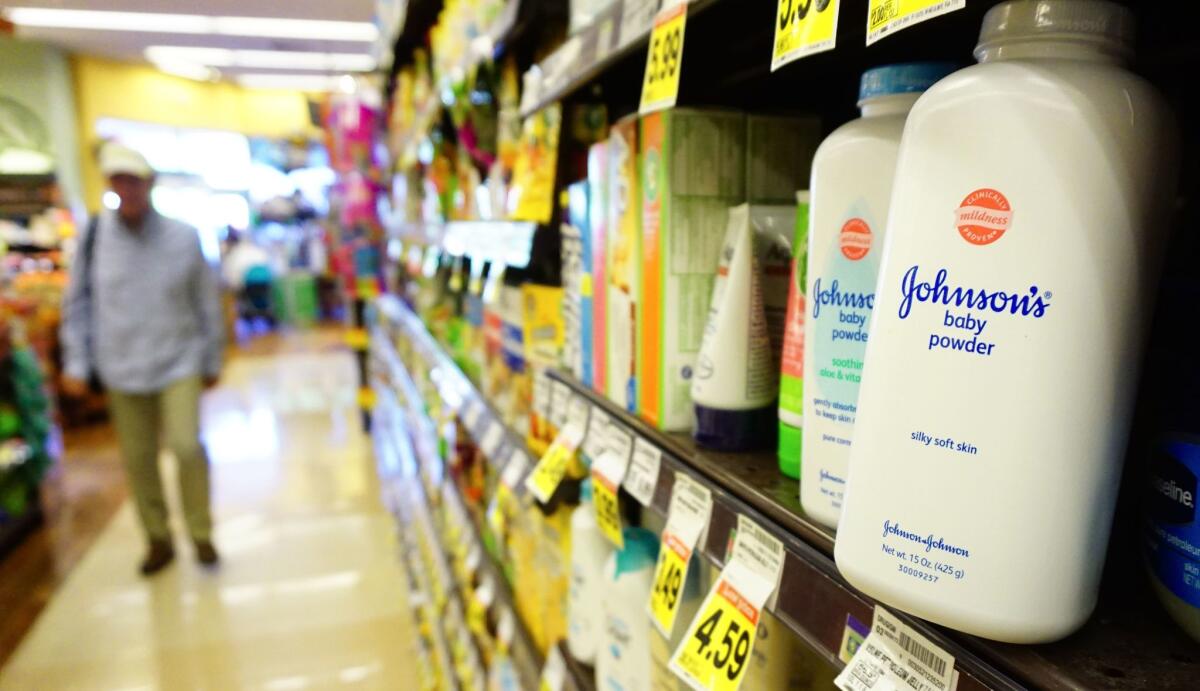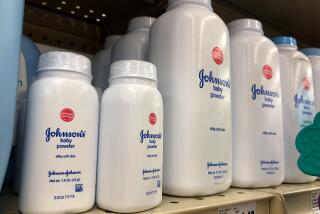J&J gets a new trial after jury awards $417 million in talc case

- Share via
Johnson & Johnson deserves a new trial after a jury ordered the world’s largest maker of healthcare products to pay $417 million to a woman who blamed the company’s iconic baby powder for causing her cancer, an appeals court concluded.
Although there was sufficient evidence to uphold the jury’s finding that a J&J unit improperly failed to warn Eva Echeverria about the health risks of talc-based powder, conflicting evidence about the product’s cancer links warrants another trial, the Los Angeles court said Tuesday.
The ruling is good news for J&J, which suffered a string of recent defeats in lawsuits alleging the company knew its talc-based products could cause various types of cancers and put profit over people’s health.
Last month, a California jury ordered J&J and Colgate-Palmolive Co. to pay about $10 million to a dying woman who said asbestos in their talc products caused her cancer. In May, a New York jury ordered J&J to pay $325 million to another woman who blamed her asbestos-related cancer on baby powder use.
“We look forward to retrying the remaining piece of this case and again demonstrating to the jury that talc does not cause ovarian cancer,” Ernie Knewitz, a J&J spokesman, said Wednesday in an emailed statement.
He also noted that in June, a Missouri appeals court threw out — on jurisdictional grounds — a $70-million award to a California woman who had a St. Louis jury in 2016 weigh her claims that J&J’s baby powder caused her cancer. The state’s intermediate appellate court said Deborah Giannecchini shouldn’t have been allowed to try her case as an out-of-state plaintiff.
J&J and its Janssen unit face more than 13,000 claims that its powders caused ovarian cancer and mesothelioma, a rare cancer linked to asbestos exposure. The company denies its products ever contained the carcinogen and argues talc doesn’t cause the life-threatening illnesses.
In October 2017, a Los Angeles jury found J&J’s baby powder played a role in the development of Echeverria’s ovarian cancer and awarded her $70 million in compensatory damages and $347 million in punitive damages. She died after the trial ended.
Los Angeles County Superior Court Judge Maren Nelson later threw out the jury’s finding, ruling there wasn’t sufficient evidence of liability on the part of J&J and one of its units to support the panel’s finding. The judge also tossed out the jury’s finding that the companies should pay punitive damages for their mishandling of their talc-based products.
The appeals court ruled Nelson erred in throwing out the jury’s finding that J&J’s baby powder was a cause of Echeverria’s cancer, noting there was “substantial evidence” of liability on Janssen’s part. The judges said parent company J&J, which stopped making the powder in 1967, couldn’t be held liable for a failure to warn. Only the subsidiary that manufactured the product would have had a duty to warn about an alleged risk.
“The evidence also failed to support a finding of malice as required for punitive damages,” the California Court of Appeal said.
J&J is gearing up for talc trials in other state courts around the U.S. A jury in the company’s hometown of New Brunswick, N.J., is scheduled to start hearing evidence July 15 of four women’s claims that J&J and Janssen are responsible for their cancers.
More to Read
Inside the business of entertainment
The Wide Shot brings you news, analysis and insights on everything from streaming wars to production — and what it all means for the future.
You may occasionally receive promotional content from the Los Angeles Times.










